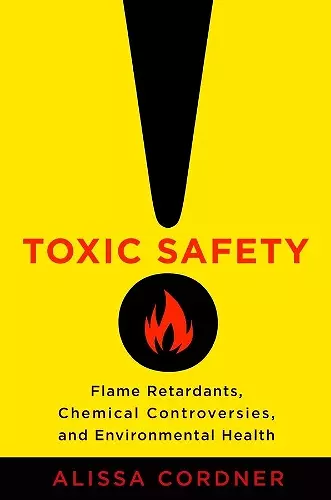Toxic Safety
Flame Retardants, Chemical Controversies, and Environmental Health
Format:Hardback
Publisher:Columbia University Press
Published:15th Apr '16
Currently unavailable, and unfortunately no date known when it will be back

Initially marketed as a life-saving advancement, flame retardants are now mired in controversy. An experienced environmental sociologist, Alissa Cordner describes how stakeholders use scientific evidence to support nonscientific goals. A revelatory text for public-health advocates, Toxic Safety demonstrates that while all parties interested in health issues use science to support their claims, they do not compete on a level playing field and even good intentions can have deleterious effects.
Marketed as a life-saving advancement, flame retardants are now mired in controversy. Alissa Cordner describes how stakeholders use scientific evidence to support nonscientific goals. Toxic Safety demonstrates that while all parties interested in health issues use science to support their claims, they do not compete on a level playing field.Initially marketed as a life-saving advancement, flame retardants are now mired in controversy. Some argue that data show the chemicals are unsafe while others continue to support their use. The tactics of each side have far-reaching consequences for how we interpret new scientific discoveries. An experienced environmental sociologist, Alissa Cordner conducts more than a hundred interviews with activists, scientists, regulators, and industry professionals to isolate the social, scientific, economic, and political forces influencing environmental health policy today. Introducing "strategic science translation," she describes how stakeholders use scientific evidence to support nonscientific goals and construct "conceptual risk formulas" to shape risk assessment and the interpretation of empirical evidence. A revelatory text for public-health advocates, Toxic Safety demonstrates that while all parties interested in health issues use science to support their claims, they do not compete on a level playing field and even good intentions can have deleterious effects.
How could a class of chemicals as dangerous to health and limited in usefulness as flame retardants have become as widespread as they have? How could scientists, advocates, legislators, firefighters, and others mount an effective campaign to curb their use? Toxic Safety tells this story with great finesse, while setting the bar for research on chemical controversy. Cordner's notion of 'strategic science translation' and her elaboration of multiple approaches to risk will be standards for future environmental and public health scholars. -- Phil Brown, author of Toxic Exposures: Contested Illnesses and the Environmental Health Movement The flame retardant controversy serves as a fascinating case study of how scientific policies are made. Toxic Safety is a well-researched, well-organized, and well-written real-life example of how science contributes to policy. -- Julie Herbstman, Columbia University An important, well-documented, and well-told account. Recommended. CHOICE An important contribution to questions about how we regulate environmental chemicals and how stakeholders shape this process. Medical Anthropology Review
- Winner of Allan Schnaiberg Outstanding Publication Award, American Sociological Association Section on Environmental Sociology 2018
ISBN: 9780231171465
Dimensions: unknown
Weight: unknown
352 pages